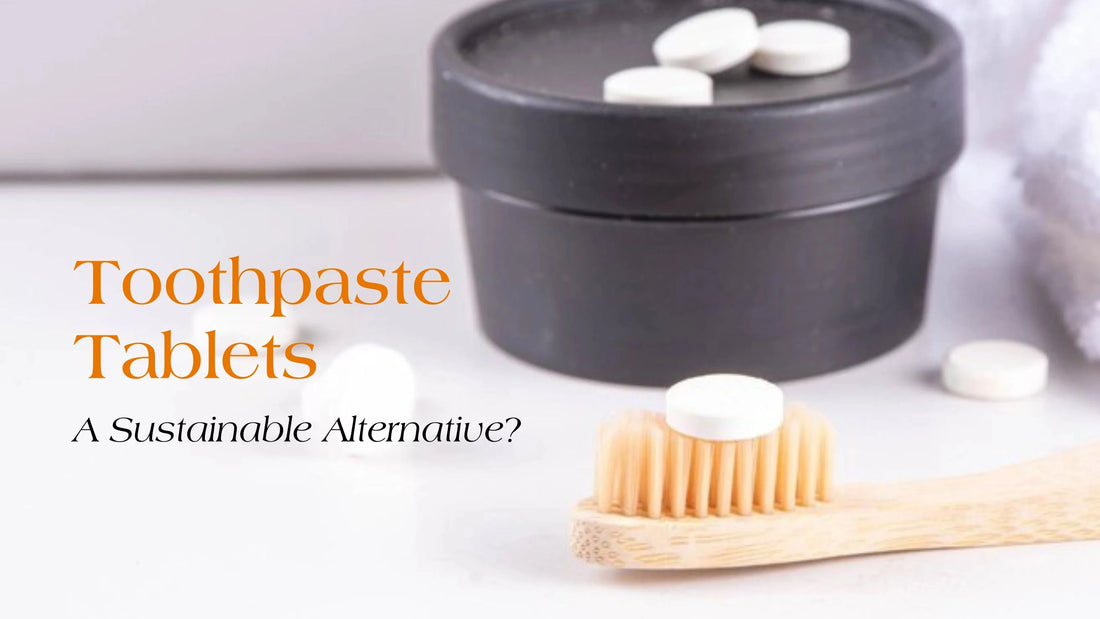
Toothpaste Tablets: A Sustainable Alternative?
Akayu IndiaLooking for a natural and effective toothpaste? Herbal Toothpaste is made with Ayurvedic ingredients like Neem, Clove, Babool, and Charcoal to keep your teeth strong, gums healthy, and breath fresh. Free from harmful chemicals, it’s a safe and eco-friendly choice for daily oral care. As more people move towards natural and sustainable products, herbal toothpaste is becoming a popular alternative to regular toothpaste.
The world is moving towards sustainability, and personal care products are no exception. One such innovation gaining traction is toothpaste tablets, which offer an eco-friendly and waste-free alternative to traditional toothpaste tubes. As consumers become more conscious of plastic pollution and harmful chemicals, toothpaste tablets present a promising solution for a cleaner planet and healthier oral hygiene.
What Are Toothpaste Tablets?
Toothpaste tablets are small, chewable alternatives to regular toothpaste. Instead of squeezing paste from a plastic tube, users simply chew a tablet, mix it with saliva, and start brushing. These tablets contain essential ingredients to clean teeth, freshen breath, and maintain oral health—without the unnecessary waste.
Why Choose Toothpaste Tablets?
Toothpaste tablets offer several advantages over traditional toothpaste:
1. Eco-Friendly and Plastic-Free
- Most traditional toothpaste comes in plastic tubes that take hundreds of years to decompose.
- Toothpaste tablets are typically packaged in recyclable glass jars, metal tins, or compostable pouches.
2. Travel-Friendly and Convenient
- No risk of messy spills or TSA liquid restrictions.
- Pre-measured for the perfect amount every time.
- Lightweight and easy to carry for on-the-go oral hygiene.
3. Minimal and Natural Ingredients
- Often free from artificial preservatives, parabens, sulfates, and fluoride (depending on the brand).
- Contains natural cleaning agents like baking soda, coconut oil, and essential oils.
4. Water Conservation
- Traditional toothpaste production requires water-intensive processes.
- Toothpaste tablets reduce water waste and minimize the carbon footprint.
Key Ingredients in Toothpaste Tablets
Most toothpaste tablets contain a combination of these essential ingredients:
- Baking Soda (Sodium Bicarbonate) – A natural whitening agent and odor neutralizer.
- Xylitol – A sugar substitute that helps prevent cavities and supports gum health.
- Calcium Carbonate – A gentle abrasive that helps remove plaque and stains.
- Essential Oils (Mint, Tea Tree, Clove, etc.) – Provide freshness and antibacterial benefits.
- Coconut Oil – Known for its antimicrobial properties and ability to combat bad breath.
Market Trends and Growing Popularity
The demand for sustainable products has fueled the rise of toothpaste tablets. Major brands and startups alike are launching innovative formulations to meet consumer needs. The market growth is driven by:
- Increased Environmental Awareness – Consumers are prioritizing zero-waste and plastic-free alternatives.
- Rise of Vegan and Cruelty-Free Products – Many toothpaste tablets are vegan, cruelty-free, and made without animal testing.
- Subscription-Based Models – Brands offer convenient subscription services for regular refills, reducing single-use packaging.
- Retail Expansion – Availability in supermarkets, health stores, and online marketplaces makes them more accessible.
How to Use Toothpaste Tablets
Using toothpaste tablets is simple and effective:
- Take one tablet and place it in your mouth.
- Chew until it breaks down and mixes with saliva.
- Brush as usual with a wet toothbrush.
- Rinse and enjoy a fresh, clean feeling!
Choosing the Right Toothpaste Tablets
With multiple brands available, here’s what to look for when choosing toothpaste tablets:
- Fluoride vs. Fluoride-Free – If you need cavity protection, opt for fluoride versions.
- Certified Natural and Organic Ingredients – Check labels for non-toxic, plant-based ingredients.
- Taste and Texture – Some tablets have a chalky texture, while others foam like traditional toothpaste.
- Recyclable or Compostable Packaging – Ensure the brand aligns with your sustainability goals.
Frequently Asked Questions (FAQs)
1. Are toothpaste tablets as effective as traditional toothpaste?
Yes! Many contain the same active ingredients as traditional toothpaste, providing cavity protection, plaque removal, and fresh breath.
2. Do toothpaste tablets foam like regular toothpaste?
Some brands include mild foaming agents, while others use natural alternatives or avoid foam altogether. The experience varies based on the formulation.
3. Are toothpaste tablets safe for kids?
Yes, but it’s essential to choose kid-friendly formulations with gentle ingredients and ensure they do not swallow the tablet.
4. How long does a jar of toothpaste tablets last?
Most jars contain around 60-120 tablets, lasting 1-2 months depending on usage (typically 1 tablet per brush).
5. Where can I buy toothpaste tablets?
They are available online, in eco-friendly stores, and increasingly in supermarkets and pharmacies.
Conclusion
Toothpaste tablets are an innovative and sustainable alternative to conventional toothpaste, offering a plastic-free, travel-friendly, and natural oral care solution. As more consumers embrace zero-waste lifestyles, the demand for these tablets is expected to grow. Whether you're looking for a convenient travel companion or a way to reduce your environmental footprint, making the switch to toothpaste tablets is a small yet impactful step towards a greener future.
 +91 96109 61060
+91 96109 61060

